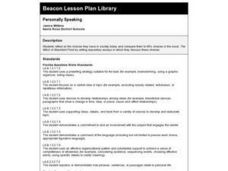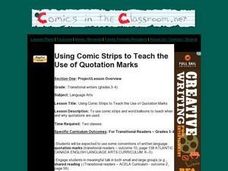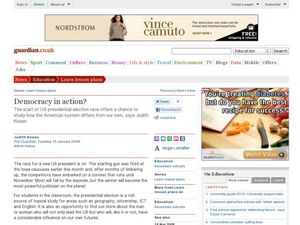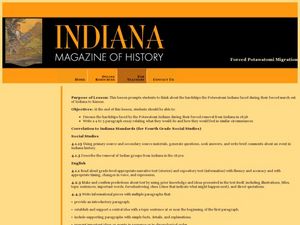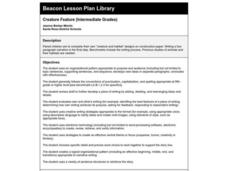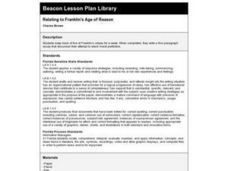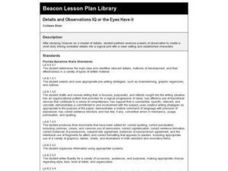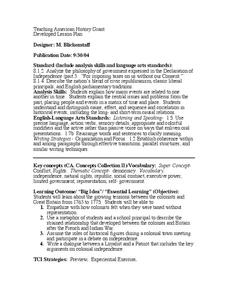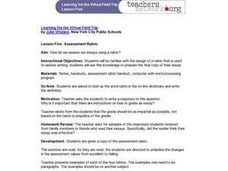Curated OER
Creative Coin Stories
Students participate in a round-robin writing activity started from a single writing prompt. Different coins be worked into the story throughout the course of the activity.
Curated OER
Personally Speaking
Seventh graders read, "The Witch of Blackbird Pond," and write an expository essay discussing choices they have in society today compared with the character Kit.
Curated OER
Using Comic Strips to Teach the Use of Quotation Marks
Students identify when and why quotations are used. Using comic strips and speech bubbles, they read and discuss examples of quotation marks, and in pairs write text for a cartoon on a piece of paper using quotation marks around the...
Curated OER
Democracy in Action
Students consider words that reflect their knowledge and opinions about democracy. They work in groups to research countries that have recently transitioned to democratic forms of government.
Curated OER
Journalist Japes
Students explore the career of a journalist. In this careers instructional activity, the teacher introduces the work of a journalist, then students use a worksheet as a springboard for a journalism activity as they write a news article...
Curated OER
Animal Coverings
Students read a book. In this animal characteristics instructional activity, students read the book Animal Coverings, answer comprehension questions, and complete a chart where they match animals with their coverings.
Curated OER
Ionic Chemical Formulas Days 1 & 2
Students study polyatomic ions and write binary and ternary ionic chemical formulas. They explore putting together different monatomic ions and coming up with as many chemical formulas as possible. They play a game similar to memory...
Curated OER
Forced Potawatomi Migration
Fourth graders write about the forced Potawatomi migration. In this primary source lesson students are read journal entries from an emigrating party of Potawatomi Indians. Students reflect on the items the Indians might have taken with...
Curated OER
Creature Feature
Students work in pairs to create a creature and its habitat out of construction paper. Then students write a narrative to describe the animal and its habitat.
Curated OER
Novel Creation
Learners create an alternate ending with digital animations to illustrate their text. In this novel creation activity, students read a novel and analyze the plot in small groups. Learners collaborate on an alternate ending and create a...
Curated OER
Defending Great Literature
Students defend Mark Twain and the study of The Adventures of Huckleberry Finn using persuasive techniques, appropriate word choice, and correct letter format, in response to a fictional letter by an upset parent.
Curated OER
Relating to Franklin's Age of Reason
Fourth graders read a selection describing 13 virtues from "The Autobiography of Benjamin Franklin." They keep track of their behavior and whether or not they can keep up with 5 chosen virtues. They write a 5 paragraph essay on their...
Curated OER
Details and Observations IQ or the Eyes Have it
Fourth graders study Chaucer as a master of details. Then, they create a short story linking unrelated details into a logical plot with a clear setting and established characters. This lesson has some excellent worksheets attached!
Curated OER
Chemical Formulas
Students assess how to go from writing ionic chemical formulas to nomenclature and naming chemical compounds. They brainstorm former studies and share their thoughts in small groups. A list of everyday products (shampoos, toothpaste,...
Curated OER
Relationship Between Addition and Subtraction
Young scholars are taught how to add and subtract and use number sense to solve basic math problems. In this addition and subtraction lesson, students are being taught using theories from different philosophers in education. They are...
Curated OER
The Declaration of Independence
Students empathize with the colonists. In this lesson on the Declaration of Independence, students collaborate to problem solve a school dilemma that enables them to understand the issues and difficulties that occurred in the creation of...
Curated OER
China's Long March
Students pretend they are a peasant during the time of the March in China. They have been mistreated by Warlords and have very little in their homes. They have been approached by the Red Army to join forces with them. What will...
Curated OER
The New Texas Two-Step
Sixth graders work with mathematical expressions by interpreting, analyzing and problem solving with them. In this two step algebraic problem solving lesson, 6th graders use algebra tiles to solve equations.
Curated OER
Fourth Grade Earning and Learning Podcast
While this lesson is connected to social studies curriculum that is not identified, the activity could be used as a template for a review of any material. The lesson focuses on a review of vocabulary relating to the economy. Pupils...
Curated OER
Assessment Rubric
Students complete their activities related to writing persuasive essays. As a class, they review the components and structure of a rubric. They use this information to write their final essay on educational opportunities at amusement parks.
Curated OER
If Hornets Could Talk
Fifth graders create a school newspaper. In this journalism lesson plan students write articles for a school newspaper. They also create an informational website. the projects are both on-going.
University of Chicago
Using Artifacts for Clues About Identity
Learn about the ancient Near East through a close examination of ancient artifacts. Lead your class into analysis by first observing an artifact as a class. Pupils can then work in pairs to analyze the other artifacts and compile a list...
Center for Civic Education
The Power of Nonviolence: Music Can Change the World
Here is a fantastic activity through which class members discover how music has the ability to influence others in a meaningful way. After reviewing selected pieces and modern-day protest songs, learners will research other songs that...
Curated OER
Wacky Web Tales
Students study the parts of speech and then review them. They identify each part of speech and place them on a tree map. Then they visit a website to create a "Wacky Web Tale" using information from the tree map. They print their tales...



